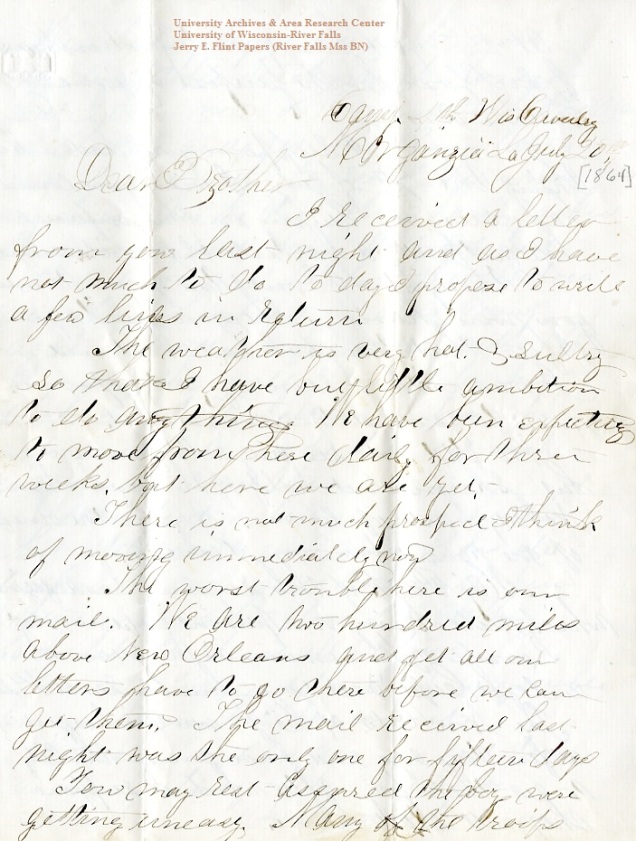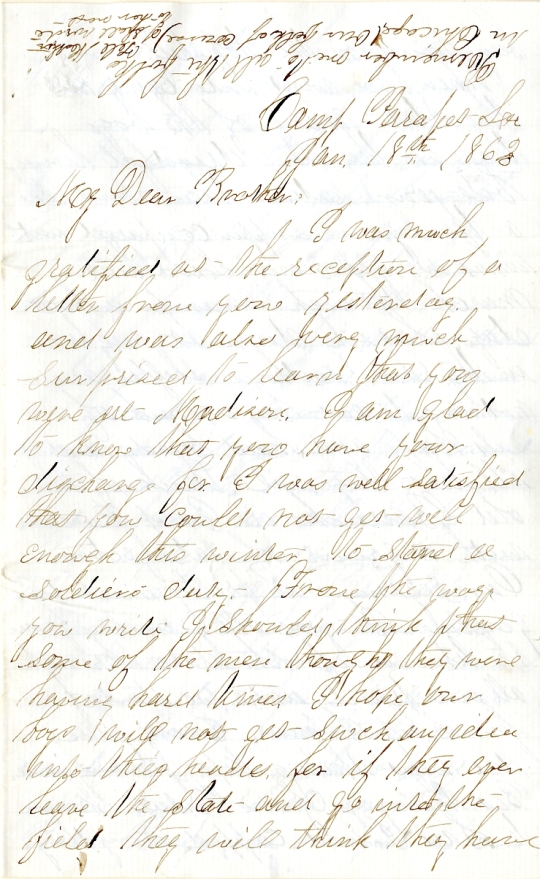Following is the weekly summary of war-related news from The Polk County Press of December 10, 1864, and a much smaller roundup of news from The Prescott Journal of the same date.
The “Message” referred to in the first item is President Abraham Lincoln’s message to Congress, what we today call the State of the Union Address but in those days was a written message. We will be posting it next week when the Journal prints it.
From The Prescott Journal:
THE NEWS.
— Congress met on Monday last, and the Message was delivered the next day. The Message is a brief, clear, common sense document. It gives a satisfactory exhibit of our condition and relations with other Governments, and on the absorbing question of the Rebellion, it announces the purpose of adhering to the policy hitherto pursued. That policy embodies the conviction and purpose of the American people. We shall give the Message in full next week.
— Gov. LEWIS has issued an important proclamation, calling upon the citizens and the local authorities to thoroughly revise and correct the enrollment in their several localities. [James T. Lewis]
— SHERMAN has doubtless reached the coast, and his magnificent movement is an assured success. [William T. Sherman]
—HOOD, who was badly beaten at Franklin a few days ago, has gathered up his forces, and a battle is expected near Nashville. [John Bell Hood]
From The Polk County Press:
News Summary.
— Valandigham [sic] announces in the Dayton papers that he has resumed the practice of Law. [Clement L. Vallandigham]
— The government of Canada, in consequence of alleged rebel procedures in that province, has issued a proclamation forbiding [sic] the exportation, carriage coastwise or by inland navigation, of arms and ammunition.
— The President has issued a proclamation opentng [sic] the ports of Norfolk, Virginia, and Fernandia and Pensacola, Florida, to domestic and foreign commerce.
— The “Times” Nashville correspondent says that Beauregard’s army consists of 25,000 infantry and 15,000 cavalry. [P.G.T. Beauregard]
—The Milwaukee “Sentinel” says that Gen. Pope [John Pope], who has so worthily administered the affairs of this Department for some time past, has been requested by the Secretary of War to report in person at Washington. It thinks this means that he is to be assigned an active command somewhere.
— The 9th Wis. Vol. returned to Milwaukee on the 29th ult., to be mustered out, their time having expired. They receive a reception such as their patriotic record merits.
— Thanksgiving day was observed by all classes of people throughout the Country in a manner seldom if ever before known. Our exchanges are filled with accounts of dinners, sermons, &c. Harvey Hospital, at Madison had a rousing Thanksgiving dinner and an appropriate address. Thanksgiving in the army passed off finely in all the departments.
— The gallant 18th regiment have arrived, on veteran furlough. They received a cordial wellcome [sic].
— Judge Wright,¹ of Georgia, formerly a member of the United States Congress, has passed through Nashville to Washington, to see what can be done towards bringing about a peace. He reports the common people as for peace. The Georgia Legislature convenes in a few days, when efforts will be made to save to [sic: the] State by coming back into the Union.
— Among the significant articles in the rebels newspaper is one in the Richmond “Whig” of the 20th inst., urging the little real importance to the Confederacy of Richmond. This is evidently put forth to check the shock its fall will produce.
— Wood is $100 per cord in Richmond and many families are without fuel.
— Exchanged prisoners, of the late 10,000, are arriving at Annapolis.
— Official returns from all the counties in Illinois have been received at the Secretary of State’s office. The total vote for Lincoln is 180,595 ; total for MClellan [George B. McClellan] 158,830 ; Lincoln’s majority 30,775.
— A remonstrance has been received by the Chamber of Commerce from the merchants of Bahia against paying the $50,000 reward for the capture of Florida.
— The “Herald’s” New Orleans cerrespondent [sic] gives brief account of a brilliant affair in Louisiana. Gen. A. [__], commanding the Union forces at Baton Rouge, returned to that point on the 22d ult., from an expedition to Liberty and Brookville bringing with him three pieces of artillery, 700 and 800 horses and mules and 200 prisoners, including the entire staff of Gen. Hodge,² all of which were captured after spirited engagement with the enemy.
— According the the “World’s” Fortress Monroe correspondent, the Florida had been ordered to Norfolk, to coal, and just before starting she was run into by the transport steamer Alliance, and very seriously damaged.
She was in a very bad condition when captured, and the steamers pumps were kept constantly going.
— After the last collision she filed [sic] at the rate of eight inches an hour. An additional pump was set at work and every effort made to keep her afloat but all to no purpose, and before she could be towed to shoal water, she went down.
— A suspicious vessel has been seized at Portland, Maine.
— Memphis papers give detailek [sic] accounts of a plot by rebel agents to burn the Memphis & Charleston railroad depot, and Government stores, valued at $2,000,000. The plot was discovered by U.S. Detectives, to whom the matter was entrusted by Gen. Washburne [sic: C. C. Washburn] and the incendiaries were captured in the act of firing the building.
— An arrangement has been entered into by which the confederate government is permitted to send one thousand bales of cotton to New York and sell it there,—the proceeds to be applied to the purchase of necessaries and comforts for rebel prisoners. The business is to be conducted by rebel officers paroled for the purpose.
— The army correspondent of the “Tribune” says guns have been sent to the front which will throw shells into Richmond from our nearest position. The shells is [sic] inflammable to an extraordinary degree, and it is thought the rebels will be burned out with them.
— Attorney Gen. Bates has resigned his position in the Cabinet. Subsequently the President appointed Judge Advocate Holt to the vacancy, but he has declined the honor. [Edward Bates, Joseph Holt]
LATEST.
News from Sherman is glorious ! He has marched through Georgia like a giant, and left a wide and desolate path behind him ! His army has been uniformly victorious in all its engagements. They have captured towns, cities, villages, stores, cotton, horses, cattle, mules, negroes, etc., etc., and destroyed nearly every railroad running through the State.—Sherman has done his work thoroughly, and it is announced that his army has arrived safe on the coast and is in communication with the navy. We shall give the particulars next week. We then shall, probably, have the pleasure of announcing the capture of both Savannah and Charleston.
—Ex Secretary Chase has been appointed Chief Justice, vice Taney, deceased. This is good news. [Salmon P. Chase, Roger B. Taney]
1. Augustus Romaldus Wright (1813-1891) was a politician and lawyer in Georgia, and served as judge of the superior court of the Cherokee circuit (1842-49) and as a judge of the superior court of Georgia (1855-57). In 1856, Wright was elected to the U.S. House of Representatives and served one term from 1857–59. Later he served as a delegate to the Georgia Secession Convention and the Confederate Secession Convention, and in the First Confederate Congress. Wright organized “Wright’s Legion” of Georgia volunteers and was colonel of the 38th Georgia Infantry Regiment (CSA). After the War, Wright served as a member of the Georgia constitutional convention (1877).
2. George Baird Hodge (1828-1892) graduated from the U.S. Naval Academy in 1845, was an acting lieutenant, but resigned his commission in 1850. He became a lawyer in Kentucky and was elected to the Kentucky House of Representatives (as Democrat) in 1859. Hodge enlisted in the Confederate Army in 1861, but soon after was chosen to represent Kentucky in the Provisional Confederate Congress (1861-62). Hodge represented Kentucky in the House of Representatives of the First Confederate Congress (February 1862 to February 1864). In his military career, he was promoted to captain and assistant adjutant general in Breckinridge’s First Kentucky Brigade. Hodge received a promotion to major in May 1862 for gallantry at the Battle of Shiloh and served as a cavalry brigade commander under Joseph Wheeler and Nathan Bedford Forrest. Wheeler commended Hodge for his service during the Middle Tennessee Raid. Forrest, however, relieved Hodge of his command, charging him with incompetence and cowardice, but he was acquitted of the charges and reinstated to field command. Hodge was promoted to colonel in May 1863 and to acting brigadier general in November 1863 but the promotion was not confirmed; his commission was finally approved in 1865. In 1864 he was assigned command of the District of Southwest Mississippi and East Louisiana, a post he held until the end of the war. After the War he served in the Kentucky Senate (1873-77) and spent his last years growing oranges in Florida.







